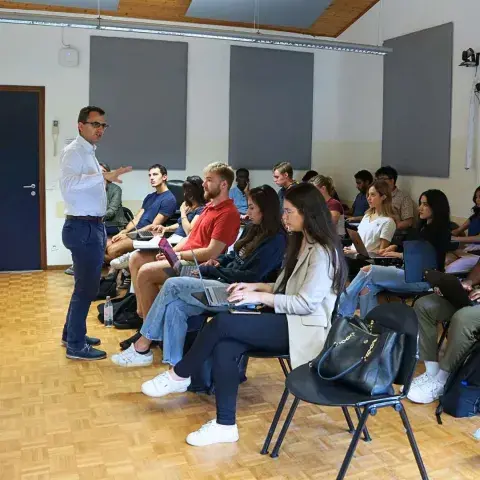
In the Fall Semester of 2024, Franklin University Switzerland proudly launched the Career Readiness Pathway Program, designed to empower students with the skills and experiences essential for success in their future careers. Open to all students, the program offers a unique chance to explore career interests, develop key competencies, and gain practical experience through hands-on learning and mentorship. As a cornerstone of Franklin’s Strategic Plan, the Career Readiness Pathway Program is structured to be flexible, accessible to students of all majors, and can be completed within a year.
In line with Franklin's commitment to career readiness, Faculty members always strive to provide students with effective and innovative teaching methods that help them become informed citizens who can thrive in today’s highly globalized and technological society. An example is the Personal Finance course at Franklin taught by Professor David Suleiman, Assistant Professor of Finance and current Chair of the Division of Business and Economics.
In the light of the COVID pandemic, the current high inflation, and an uncertain economic outlook, educating people in financial literacy is of utmost importance1. However, several studies in the finance literature have shown that traditional approaches to financial education may lack experiential learning components that help students connect theory and practice2. As a result, Professor Suleiman created a Personal Finance course that is structured around four key personal finance concepts and that includes four distinct experiential learning assignments. This includes students working on a career strategy plan, developing a hypothetical budget for different scenarios, analyzing and evaluating financial services offered by the students’ bank and finally, playing a stock market simulation game.
Furthermore, Professor Suleiman describes this innovative approach to teaching financial literacy in a research article that has been presented at the Academy of Economics and Finance conference and that has been published in the Journal of Instructional Pedagogies. This resulted in an external validation of this innovative teaching method and is a prime example of how academic research improves teaching at Franklin and benefits our students directly. It is also a great example of how finance can be integrated into a liberal arts college by teaching students about knowledge and skills that can be applied to a wide variety of areas.
For example, as part of this course, students learn developing a strategic career plan for the time during and after college. As part of this assignment, Ebonie Rayford, Assistant Dean of Student Life and Career Services, recently joined the class for a 1-hour workshop and taught students how to effectively create a resume. Such life skills are relevant for career readiness and thus, this course plays an integral role in fulfilling one of our objectives in our strategic plan.
LEARN MORE ABOUT CAREER READINESS
1 Clark, R.L., Lusardi, A. and Mitchell, O.S., 2021, May. Financial fragility during the COVID-19 pandemic. In AEA Papers and Proceedings (Vol. 111, pp. 292-296). 2014 Broadway, Suite 305, Nashville, TN 37203: American Economic Association.
2 Frijns, B., Gilbert, A., & Tourani-Rad, A. (2013). Why Do Financial Literacy Programmes Fail?. Applied Finance Letters, 2(1), 18-21.

